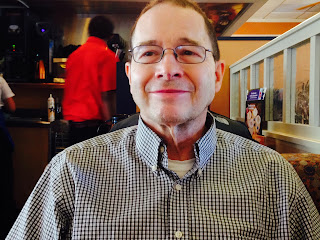....in a word: TRANQUIL.
Each time I've visited David over the past several weeks, I find him in the same places--either sitting on the couch--usually his head nodded downward and dozing--or walking around the yard very determinedly, or sitting in a chair in the front sitting room. Many of the other residents are doing much the same. One part of me thinks this must be terribly boring, but David appears by all accounts to be enjoying the peacefulness here.
 He is always eager to go for a walk when I arrive, and we've fallen into a nice routine--walking down to 15th Ave, stopping at Caffe Ladro for a coffee, then walking back. He doesn't say much, but every now and then he'll come out with a comment that seems out of nowhere. Last week I asked him what he was thinking about, and he pointed at a house we were walking by and said: "I was thinking about the guy who lives in that house--I've been waiting for him to get home."
He is always eager to go for a walk when I arrive, and we've fallen into a nice routine--walking down to 15th Ave, stopping at Caffe Ladro for a coffee, then walking back. He doesn't say much, but every now and then he'll come out with a comment that seems out of nowhere. Last week I asked him what he was thinking about, and he pointed at a house we were walking by and said: "I was thinking about the guy who lives in that house--I've been waiting for him to get home."
OK.....
One could imagine all sorts of things this might have meant to him. David was very active for many years in this neighborhood, meeting people in their homes for various reasons, so perhaps he was having a recollection of this as we walked past.
More likely though, it was probably a random thought that happened to be going through his mind when I asked the question. His mind is now operating under a completely different set of principles than yours or mine--our brains are these incredibly complex living organisms that sit inside our heads and go about business with complete autonomy. We have no idea--or control--of how this magnificent organ operates, and Alzheimer's disease has shown us how little we can do when things start malfunctioning. This disease has taken many great minds and turned them--and their families--upside-down.
One thing I love about going to Mass with him every Sunday is how others still approach him. He was a wildly popular priest, and spent over 40 years traveling around to all of the parishes in Western Washington. He knew that he had a special gift, but would rarely tout that as some kind of grand achievement. He was humble in the way of his mentor, Archbishop Raymond Hunthausen, and never sought out special privilege or status.
 People see him at St. Ignatius and reach out to say hello and shake his hand. David always responds with a big smile and nod of his head, but it is immediately obvious that he is unable to speak a word. This often brings about a subtle change in the others' expression--from a big smile of recognition to one of--'oh, something is wrong.' Then they look to me. There is no need for me to say anything.
People see him at St. Ignatius and reach out to say hello and shake his hand. David always responds with a big smile and nod of his head, but it is immediately obvious that he is unable to speak a word. This often brings about a subtle change in the others' expression--from a big smile of recognition to one of--'oh, something is wrong.' Then they look to me. There is no need for me to say anything.So while it's reassuring to know that David is comfortable and happy--and to share that everything seems to be OK with pictures of all smiles--the truth is rather different. David has suffered from a breathtakingly fast diminishment. I find myself thinking about the horrible injustice of losing David in this way. Not only the loss to me and his family and close friends, but the loss to so many in the community that would still have access to such a brilliant light of goodness; his humorous and compassionate words when presiding from the pulpit, his unique, gentle way of explaining sometimes conflicting Catholic teachings, and his calming voice when visiting the sick and dying. There are few in this world who can reach out like he could, and our lives have also been diminished by this loss.
In the end, it comes down to this: instead of dwelling on the loss of what could have been, it's more enriching to see David where he is right now. Our memories of him provide the context we enjoy to remember him with, and my close connection to him has given me a special privilege of being with him and all that he was.
He's still here. We still love him.


No comments:
Post a Comment